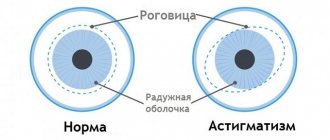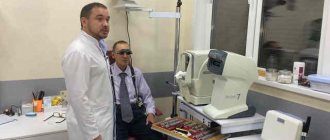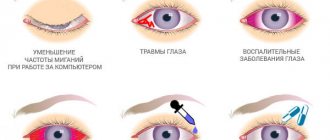The basis for the healthy functioning of the body is proper nutrition - everyone knows this, but not all people know about the existence of special vitamins for improving vision and eye health. But the development of some eye diseases, such as cataracts, macular degeneration, glaucoma and dry eye syndrome, can be delayed or completely prevented with the help of certain vitamins and minerals.
Vitamin A
This vitamin and its importance for the human body were the first to be studied, which is why it received its name. It supports good immune function, maintains healthy skin and, in addition, significantly reduces the likelihood of developing infectious eye diseases and is essential for the function of the retina. Instillation drops containing vitamin A are very effective in treating dry eye syndrome.
Vitamin A is included in the following multivitamin complexes: “Vitaspectrum”, “Aevit”, “Napravit”, “Complivit Oftalmo”, “Bio-Max”, etc.
A lot of natural vitamin A is found in carrots, sweet potatoes, apricots and spinach.
Who needs drugs
Vision improvement products are intended for people who have the following ophthalmological diseases:
- Cataract.
- Glaucoma.
- Farsightedness.
- Myopia.
How to restore vision
Also, drugs are quite important for those who have systemic diseases such as diabetes, high blood pressure, and varicose veins of the lower extremities. Sometimes vision medications can be prescribed as a preventive measure for people over 40-45 years of age.
Vitamin C
In normal health, vitamin C is a component of the eye's lens and is part of a natural mechanism that helps prevent the development of cataracts. In addition, it plays a key role in the synthesis of collagen, which is necessary to maintain the elasticity of the walls of blood vessels, including the capillary vessels of the retina. Vitamin C together with vitamin E reduce the likelihood of developing macular degeneration.
Eye drops containing vitamin C: “Khrustalin”, “Katachrome”.
Vitamin C is found in oranges, kiwi, strawberries, broccoli, peppers, mustard and other vegetables and fruits.
Varieties
The drug will help restore the eyes after heavy visual stress.
All drugs for improving vision are divided into 3 groups:
- Medications with a relaxing effect on the muscles of the eyes. The best remedy in this group is Atropine.
- The products can relieve eye fatigue. They are prescribed to people who read a lot, work at the computer for a long time, and workers with small items: jewelers, watchmakers, seamstresses. The list of medications of this type includes “Shtulna”.
- Drugs that improve the conditions of the eye retina. The composition of such tablets may include herbal and synthetic components. Good products: “Chernikomed”, “Aevit”.
Preparations for vision restoration for internal use:
- vitamin complexes;
- means for strengthening blood vessels.
Vitamin E and zinc
When we talk about vitamin E, we are not talking about just one compound, but about a whole group of substances called tocopherols and tocotrienols. Vitamin E, like vitamin C, is part of the lens and retina of the eye. This vitamin plays a leading role in the body's antioxidant defense system. A lack of vitamin E can increase the likelihood of developing macular degeneration and cataracts.
Vitamin E is included in the following drugs: “Vision”, “Aevit”, “Aekol”, etc.
Natural vitamin E can be found in many types of nuts, seeds and dried apricots.
Vitamins C and E are antioxidants, i.e. they protect cells from the negative effects of free radicals, reducing the risk of premature aging and cell wear. Minerals such as zinc and selenium help the body absorb vitamin E.
Zinc and selenium are contained in the following multivitamin complexes: “Vitrum Vision”, “Complivit Ophthalmo”.
Zinc and vitamin E are found in eggs, beef, oysters and seafood.
Myths about vitamins
Vitamins to improve vision
The human body experiences the influence of negative factors every day; they harm and upset its usual work. Harmful oxidizing substances, so-called free radicals, are especially dangerous for the eyes, and the retina and optic nerve are most sensitive to their activity. The nerve structures in them do not have regenerative properties, so the damage caused by free radicals is irreversible.
Vitamin-mineral complexes are useful; they are needed to help the organs of our body perform their functions well. If the body is deficient in vitamins A, C or E, this can lead to retinal diseases, decreased visual acuity and worsening twilight vision. Of course, improving vision will not happen overnight, but regular use of vision vitamins will help maintain the visual system
Vitamins for vision for adults
It must be said right away that no vitamins for vision will help adults completely restore its clarity or cure serious ophthalmological diseases. Vitamins for vision help relieve eye fatigue, reduce inflammation, and activate blood flow in blood vessels and capillaries. Taking vitamin-mineral complexes is a good prevention of age-related macular degeneration (damage to the retina), the development of which is often caused by a deficiency of vitamins E, C or zinc.
A good eye vitamin should include the following:
- Vitamin E
Vitamin E (tocopherol) has the highest antioxidant properties. This antioxidant protects the body from the harmful effects of free radicals, which cause the death of cells that form eye tissue. In addition, it has a strengthening effect on blood vessels and prevents the premature destruction of red blood cells. Vitamin E deficiency is rare because this compound is found in many foods (sunflower seeds, spinach, vegetable oils, nuts, avocados, shrimp). However, vitamin E (tocopherol) deficiency may increase the risk of developing age-related changes in the retina, which can lead to blindness.
- Vitamin C (ascorbic acid)
Vitamin C (ascorbic acid) is a vitamin without which we cannot function normally. It accelerates the transport of useful elements between cells, participates in the formation of fibroblasts and connective tissue fibers. This vitamin strengthens and gives tone to the walls of blood vessels, improves the penetration of nutrients into the retina of the eye, controls the secretion of tear fluid, and increases the strength of blood vessels and capillaries. Due to collagen, which is synthesized with the help of vitamin C, tissue renewal capabilities are enhanced. Acute vitamin C deficiency can become a provoking factor in the development of increased intraocular pressure and subconjunctival hemorrhage.
- Beta-carotene (β-carotene, provitamin A)
β-carotene is an organic chemical compound, a provitamin of vitamin A and its most active isomer. It neutralizes free radicals in the body and is used as an additional remedy for diseases of vision and skin. Vitamins for adults that contain beta-carotene help improve twilight vision and maintain visual acuity. Carotenoids, which include beta-carotene, have a beneficial effect on the human body, making it more resilient and strong in the fight against chronic diseases .
- Lutein
Lutein is an organic compound, a yellow pigment belonging to xanthophyll (a subgroup of carotenoids). Thanks to special chemical bonds, lutein is able to filter blue light (phototoxic) and ultraviolet radiation. Reducing light access to the deeper layers of the retina (such as the macula of the eye) protects it from free radical formation and premature damage. Lutein is not produced by the human body, so it must be obtained externally through food or dietary supplements. Taking complexes containing lutein will be an excellent addition to the treatment of diabetic retinopathy, cataracts, allergic conjunctivitis or macular degeneration. The use of lutein is recommended for people who spend a lot of time in front of the computer, TV, or driving.
- Copper
Copper is found in trace amounts in the body, but it is very important and has many important functions. First of all, copper is responsible for the growth and proper development of the body, plays a key role in the creation of melanin, thanks to which we have a certain color of hair and skin. Copper has the ability to fight free radicals and is involved in strengthening the immune system and retinal health. This microelement is important for people with visual impairment due to diabetes.
Anthocyanins are pigments of the flavonoid group. Vitamin-mineral complexes containing blueberry anthocyanosides (Vaccinium myrtillus L.) stimulate the synthesis and regeneration of rhodopsin (the pigment responsible for visual stimulation), increase sensitivity to changes in light intensity, increase visual acuity and adaptation to darkness, and help improve blood supply to the retina . Anthocyanin deficiency negatively affects twilight vision (the ability to see well in dusk and darkness).
Zeaxanthin is one of the most common carotenoids found in nature. Zeaxanthin enters the human body through food (spinach, corn, red peppers, zucchini, kiwi, orange juice). This carotenoid plays an important role in reducing the risk of developing age-related macular degeneration and helps protect the retina from the influence of negative external factors. Zeaxanthin and lutein function synergistically, meaning they are more beneficial together than alone.
Vitamins for vision for adults with myopia
Myopia (myopia) is a visual impairment in which a person does not clearly see objects located at a far distance. The development of myopia is influenced by various factors, both genetic and environmental. It is impossible to completely cure myopia with medication, but vitamin and mineral complexes are often prescribed to help nourish the retina. Usually, vision vitamins for adults with myopia are recommended by an ophthalmologist after an in-person consultation. Among the many vitamin complexes, you should pay attention to Vitrum® Vision Plus, which contains all the necessary vitamins and microelements to maintain eye health: lutein, zeaxanthin, vitamin C, E and beta-carotene.
Myopia can only be cured by surgical procedures. Laser treatment is usually used. It involves shortening the axis of the eye so that its ability to focus is reduced to normal levels.
Vitamins for vision for adults with farsightedness
Farsightedness (hyperopia) is the next most common visual refractive error after myopia. With farsightedness, a person can see distant objects well, but sees close objects poorly. Farsightedness can be physiological; this type occurs in children, since the organ of vision and the optical system of the eye are just developing. In adults, hypermetropia can result from weakness and fragility of the blood vessels in the eye, such as during diabetes. And although complete recovery is possible only through laser intervention, ophthalmologists strongly recommend introducing vision vitamins into the diet of adults, which, in case of farsightedness, can slow down the progression of the disease. And in order to prevent a decrease in vision clarity, it is recommended that all people over 40 years of age take vitamins, for example, such as Vitrum® Vision Plus, on a regular basis.
Vitamins to improve vision: list of useful products
Of course, the most complete source of vitamins and microelements are dietary supplements. They are easy to use, each capsule or tablet contains the required concentration of compounds, and such supplements are well absorbed. But to obtain maximum benefit in the prevention of ophthalmic diseases, you need to pay special attention to your diet. Below is a list of foods that contain essential vitamins for the eyes. Regular use of these foods in your daily diet can help improve your vision. They can also be used to slow the progression of retinal diseases.
Eggs
Egg yolk is a universal source of zeaxanthin, lutein and zinc - microelements that help maintain retinal health. One egg eaten a day, for example for breakfast, will bring undeniable benefits to people suffering from myopia or farsightedness.
Almonds and pistachios
Due to their high vitamin E content, almonds can suppress the process of macular degeneration (the area of greatest visual acuity on the retina). One handful of these nuts contains half the daily recommended dose of vitamin E. Almonds can be replaced with pistachios, which contain high amounts of B vitamins and vitamin E, which are essential for eye health. Of all types of nuts, pistachios contain the highest concentration of lutein and zeaxanthin, without which the normal functioning of the visual system is impossible.
Oily fish
Salmon, sturgeon, tuna, mackerel, fatty herring, trout and sardines contain a lot of Omega-3 fatty acids, especially the two most important ones: DHA and EPA. The use of these acids has a beneficial effect on the retina and mucous membrane of the eye. Studies have shown that a deficiency of DHA in the human body leads to the development of “dry eye” syndrome, which begins to manifest itself as a feeling of “sand in the eyes.” Salmon is the healthiest fish, as it contains a large amount of Omega-3 fatty acids and vitamin D, which has a protective effect on blood vessels during age-related macular degeneration.
Tomatoes
Tomatoes contain lycopene, which suppresses the mechanisms of macular degeneration (the area of greatest visual acuity on the retina). Macular degeneration often leads to vision loss in older adults. In addition, tomatoes are rich in vitamin C, which helps maintain normal blood supply to the visual organs and protect the eyes from excessive exposure to ultraviolet radiation.
Blueberry
Blueberries contain a large amount of antioxidants, making them one of the top foods for vision support. Blueberries are rich in vitamins C, A and zinc, which is needed to stabilize the structure of the optic nerve and reduce retinal ischemia.
Spinach
One hundred grams of spinach contains 20 mg of lutein and zeaxanthin, which help protect the eye from macular degeneration and cataracts and improve twilight vision.
Vitamins Vitrum® Vision Plus
Vitrum® Vision Plus is the market leader, as well as one of the most recognizable brands among eye vitamins.
Product quality is a priority for the vitamin manufacturer. p, and the raw materials for the production of vitamin and mineral complexes come from certified suppliers who follow GMP protocols (rules that establish requirements for the organization of production and quality control of medicinal products for medical and veterinary use). After the production cycle is completed, microbiological testing is carried out to ensure the absence of pathogenic bacteria and viruses. The final step is analysis to confirm the presence of active ingredients in the correct quantities. Back
Lutein and zeaxanthin
Lutein and zeaxanthin belong to the group of carotenoids. These two vitamins naturally absorb excess light energy, so they naturally protect against the effects of high-energy blue light rays. The antioxidant properties of lutein help protect your child's eyes and prevent future problems, so getting enough of this vitamin is especially important during childhood. But lutein and zeaxanthin are necessary not only for children; these vitamins are among the most important and necessary for the good functioning of the visual organs, regardless of age.
Carotenoids are found in the cells of the macula - the central zone of the retina of the eye, due to which this area has a yellow color. Therefore, the macula is also called the macula. Along with vitamins C and E, lutein and zeaxanthin protect cells from the damaging effects of free radicals. The lack of carotenoids in the retina causes the development of macular degeneration.
The best drugs to improve vision
The occurrence of ophthalmological diseases and decreased visual acuity can occur for a variety of reasons. The main ones are:
- hereditary factors;
- poor environmental conditions;
- professional stress;
- individual characteristics of the body.
List of drugs to improve vision
Restoring vision is the main problem of society today. To get rid of such problems, you may need medications to improve your vision.
Eye drops to improve vision
After going to the pharmacy, you can find a fairly wide range of medications, dietary supplements, and vitamin complexes that are intended to improve, restore and preserve your vision. Now it’s time to understand in more detail what medications you need and when to buy them.
To relax the eye muscles
These medications can quickly relieve spasms. The most well-known and widespread remedy today is Atropine. Irifrin also receives good reviews. The patient can observe their effect for several weeks after use.
Atropine eye drops release form
However, when using these drops you need to remember two features. They should not be instilled frequently and should not be used without a doctor's recommendation. Doctors also do not recommend using these types of drops to improve vision for children.
For a night's rest for the eyes
There are many people who experience a lot of eye strain. In order for the visual organ to actively recover at night, you need to use drops of Shtulna, Reticulin, Innoha. They relieve tension and give your eyes a chance to rest. Basically, the medications for vision restoration that are listed here are not recommended for children.
To improve the condition of the retina
Eye drops that fall into this category can be considered antioxidants. They improve the nutrition of the eye and promote their further regeneration. Their compositions mainly contain oily extracts of plant origin. After studying many reviews, we can conclude that the most popular are:
- Visiomax.
- Oculist.
- Zorro.
- Equit-sightedness.
What drops can be used to improve vision?
All these drugs are recommended for people who suffer from systemic diseases. Some of the drops can also be used for children. Before using them, experts recommend consulting an ophthalmologist.
Eye drops with vitamin complex
Many reviews on the Internet report that Taufon and Quinax drops are useful. Doctors also include in this category:
- Drops according to Fedorov;
- Taurine;
- Vitafol;
- Iodurol;
- Catalin.
Eye drops Visin Pure tear to protect and moisturize the eye
In the composition of the drugs you can find substances that help fight retinopathy, presbyopia, and help activate processes in the structures of the eye. Some drugs can be used for children, but before use you must consult a doctor.
Tablets to improve vision for myopia
Popular medications for intravenous administration include Ascorutin and Omega 3, which are often produced in capsules with fish oil.
- "Ascorutin" is a combination tablet indicated for people with myopia. They contain rutin, which prevents hemorrhages in the visual system, as well as ascorbic acid, which strengthens the walls of the eye vessels. Tablets should be taken 2-3 times a day with a dosage of 50 mg.
- Omega 3 helps improve color vision and eliminate night blindness, making the body more resistant to adverse environmental factors. Medicines containing such acids are very important for the proper circulation of enzymes in the tissues of the eyes; they prevent inflammation of the cornea. The most convenient form of taking medications is gelatin capsules.
What is myopia?
People suffering from myopia have trouble seeing objects located far from them, but they can see well up close. This is due to the fact that light rays that are refracted in the visual system do not fall on the retina, as happens with normal
In this article
conditions, and in front of her. The eyeball, under the influence of certain factors, becomes enlarged and elongated, and the ability to accommodate decreases. Ophthalmologists measure the degree of refractive pathologies in diopters. If a patient is diagnosed with myopia, a “-” sign appears before the optical power indicator after vision diagnosis (for farsightedness “+”). It is important to know that the worse a person’s vision, the more serious the severity of the disease. There are three degrees of myopia:
- Weak - up to -3 diopters. There is an increase in the eyeball by 1-2 mm. A person cannot distinguish the outlines of objects and inscriptions at a distance of 10 m;
- Average - from -3.25 to -6 diopters. The eyeball lengthens by 3-3.5 mm. It becomes difficult for a person to navigate in space without vision-correcting means; he can clearly distinguish only those objects that are no further than arm’s length.
- High - over - 6 diopters. The anteroposterior axis of the eyeball is excessively enlarged, and therefore problems may arise in the circulatory system of the eyes, the walls of blood vessels become weak and thin, and degenerative changes in the visual apparatus are observed. A person sees objects at a distance of 5-10 cm from the face.
Only after a comprehensive examination of the patient’s vision will a specialist be able to determine the severity of the pathology and, based on the data obtained and the person’s lifestyle, prescribe treatment for myopia.
Dietary supplements and products that improve vision
To maintain the quality of your vision for a long time, doctors recommend eating blueberries with sugar or carrots in any form. Among other products, fish oil also has a positive effect on vision restoration. Many reviews on the Internet report that the dietary supplement “Blueberry Forte” has become quite popular. This is a unique supplement that allows you to provide a preventive effect for the treatment of decreased visual acuity. Moreover, this supplement will be indicated for both adults and children.
Blueberries forte are biological vitamins for restoring vision
It is important to know! All drugs listed in this article are medicinal. If used incorrectly, they can be harmful and therefore it is better to consult a doctor. He will conduct a diagnosis and prescribe the appropriate drug.
Vision tablets are less popular but are still used. Now you know exactly what medications to improve vision can be used to get rid of ophthalmic problems. If you have used a certain drug that is listed in the article, then share your opinion about their effect in the comments. We hope this information was useful and interesting.
Review of eye drops - how not to make a mistake when choosing?
Eye drops for fatigue and to improve vision should be selected depending on the specific factor that caused the deterioration of vision. For myopia (nearsightedness) and hypermetropia (farsightedness), these drugs are different.
Popular drops prescribed for myopia:
Emoxipin. It is a synthetic antioxidant widely used in the treatment of myopia. It has a strengthening effect on blood vessels, protects the retina and cornea from the negative effects of the disease and slows down its development.
Taufon. Suitable for both the treatment of myopia and its prevention. It contains taurine, which enhances regenerative function. The amino acid it contains helps improve metabolic processes.
Quinax. The drug prescribed for myopia is made on a vitamin basis. It contains a fairly large dose of vitamin A and ascorbic acid, which restore visual acuity. In addition, they promote the outflow of fluid from the eye and stabilize the functioning of the lens.
Effective medications for farsightedness include:
- Oftan Katahrom. Since cataracts often appear after farsightedness, experts recommend using this remedy to prevent it. It promotes tissue regeneration and stabilizes metabolic processes.
- Vita Iodurol. They normalize blood circulation in the eyeball and saturate it with vitamins, thereby improving vision in case of farsightedness.
Rules for the use of drops and solutions for the treatment of myopia
Despite the fact that putting eye drops in your eyes is not at all difficult, the procedure still requires compliance with certain rules. The fact is that it is necessary that the solution gets into a specific area, otherwise the effectiveness of its action will be reduced. In addition, to prevent infection from getting into the eyes, all actions should be carried out only after hands have been thoroughly washed, preferably with antibacterial soap.
You need to apply eye drops as follows:
- Pull the lower eyelid down slightly;
- Throw your head back;
- Look up;
- Place a few drops of the medicine into the area between the lower eyelid and the eyeball.
After completing the steps described above, you need to lightly press the inner corners of your eyes so that the solution does not leak out. If you wear lenses, agree on the schedule of instillation of the drug while wearing them with your doctor.
Article rating:
The best drugs to improve vision Link to main publication
Related publications
- Eye drops hilozar chest of drawers price
In what cases are vitamins needed for the eyes?
Photo: https://www.pexels.com/photo/macro-photography-of-eye-1786769/
Deficiency of certain substances and elements can cause various eye pathologies, causing discomfort and sometimes worsening vision. For example, a lack of vitamin A leads to “night blindness,” when at dusk a person ceases to see objects clearly. Over time, the disease leads to keratomalacia - melting of the cornea.
Do you often feel as if “sand” has been poured into your eyes? You lack Omega fatty acids and riboflavin. Is your eyelid twitching? You have a lack of vitamin B6.
Do you spend a long time sitting in front of a computer screen, a tablet, or are you glued to your smartphone? Be aware that by doing so you contribute to the development of free radicals that oxidize the proteins and lipids of the visual cells, after which vision begins to deteriorate catastrophically quickly. To prevent this from happening, the body must protect the retina from photodamage with the help of carotenoids, and they can only be obtained from food.
But hardly anyone would agree to eat two kilograms of carrots or one and a half kilos of bell peppers every day. Therefore, modern pharmaceuticals have created vitamin complexes containing a concentrated dose of beneficial substances.
By regularly consuming eye vitamins to improve vision, you will replenish the missing elements, thereby preventing the development of myopia, farsightedness and other disorders.
The drugs are necessary primarily for people at risk, namely for those who:
- already suffers from visual impairment;
- spends more than five hours at the computer or other gadgets;
- constantly wears contact lenses;
- reads a lot in low light;
- due to the nature of their work, they strain their eyesight - drivers, watchmakers, jewelers;
- suffers from diabetes mellitus, varicose veins, atherosclerosis.
It is recommended to take vitamin complexes in courses twice a year. It will be much safer if an ophthalmologist prescribes them for you.
Ophthalmic products will help you:
- stop the destructive processes caused by free radicals;
- prevent age-related changes in vision, as well as cataracts and glaucoma;
- reduce fatigue and photosensitivity;
- strengthen tissues, increase metabolic processes.











